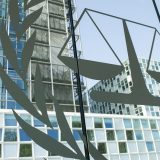. Photo ONU / Rick Bajornas
–
.
Analisis Libre Internacional
The unjustified delay in the election of the new Prosecutor of the International Criminal Court (ICC) by the Assembly of States Parties, which should have taken place last December 2020, violates article 42.4 of the Rome Statute and raises questions about the cleanliness in the election of such an important position to guarantee justice in crimes under its competence, as explained by the retired deputy of the National Assembly and Director- General of the International Committee against Impunity in Venezuela (CICIVEN), Walter Márquez.

Márquez explained that the Assembly of States Parties did choose by consensus at the annual assembly held in New York last December the members of the new board of directors, contrary to the delay in the election of the prosecutor, elected by secret ballot, and a simple majority, the 6 magistrates who will replace those who have completed the statutory period.
He highlighted that on June 15, the legal mandate of the current prosecutor Fatou Bensouda expires, so that from April 3, 2019, a selection committee for the new prosecutor and a panel of experts were chosen. The selection committee chaired by the Canadian Ambassador, Sabine Nolke, before the Assembly of States Parties, was made up of five ambassadors and five experts. Of the 144 candidates for the prosecutor job who presented, 89 formalized the registration, just 16 were preselected, and the selection committee and the panel of experts chose four candidates on consensus.
The four candidates
The four candidates selected to be ICC prosecutor were: Morris A. Anyahde from Nigeria, Fergal Gaynor from Ireland, Susan Okalany from Uganda, and Richard Roy from Canada, the names of the group were published on June 30, 2020, and should have been presented at the XIX sessions of the general assembly in The Hague and later in New York dated on December 16 and 23, 2020.
«But from June of last year until next February 5, 2021, the selection of the new prosecutor has been inexplicably extended for seven times, since they have not been able to reach a consensus on the matter,» pointed up Walter Márquez.
Márquez explained that although article 112 number 7 of the Rome Statute empowers the Assembly to seek consensus, as long as there is not a different criterion, it clearly and precisely establishes in article 42.4 that the prosecutor will be chosen in a secretly and by absolute vote.
Prosecutors questioned
The Venezuelan human rights defender, Walter Marquez, recalled that Fatou Bensouda’s predecessor prosecutor was the Argentine Luis Moreno Ocampo, nominated by the government of Néstor Kirchner in 2003; it was the time of the group of socialism of the XXI century where Hugo Chávez Frías was part.
“That prosecutor was later questioned for being related to the Panama Papers scandal and for having received money that he deposited in a tax haven. That senior ICC official paid favors to Chávez and the Kirchners, closing the investigation that was carried out against Chávez without any legal explanation, dismissing more than 20 complaints about crimes against humanity, made before his office against the then president of Venezuela”.
Then the current prosecutor Fatou Bensouda was elected in 2011, supported by the African bloc of state parties, led by the Gambian dictator Yahya Jammeh, who she had served as Attorney General and Minister of Justice.
“When she came to the position of Prosecutor at the ICC, she kept silent about the crimes against humanity committed by the Gambian dictator, and followed the line of conduct of Luis Moreno Ocampo, paralyzing the investigations on Crimes against humanity by the Venezuelan regime of Nicolás Maduro, since she came from having served a dictatorial regime in the Gambia and then continued to protect the tyranny of Venezuela, «he said.
Walter Márquez emphasized that the selection committee and the group of experts appointed by the board of the state’s part in April 2019, applied a rigorous review of the candidates for ICC Prosecutor that selected the four chosen, but after the selection of those shortlisted, five more candidates were inexplicably included, who had not been initially chosen by the election committee and the panel of experts, among them, Carlos Castresana Fernández, nominated by Pedro Sánchez, president of the Spanish socialist government and who worked with the then Judge Baltazar Garzón, who is now Alex Saab’s lawyer detained in Cape Verde, front man of the dictator Nicolás Maduro.
Transparency
To avoid the continues no application of international justice into the ICC and that there is no doubt about the honesty and capacity of the new prosecutor, Walter Márquez demanded the current president of the bureau O-Gon Kwon to comply with article 42.4 of the Rome Statute, because since there is no consensus among the States Parties for the choice of the ICC prosecutor, should submit it to a secret election by a qualified majority, otherwise the Rome Statute would be violated as has been done up to now.
Finally the Director-General of CICIVEN Walter Márquez, once again alerts the International Community, especially the NGOs representing the victims, to monitor the process of appointing the new ICC prosecutor, who must be the guarantor of the punishment against those responsible for crimes against humanity, as well as the prevention of these atrocious crimes and to rescue the good image and credibility of that international body affected by the negligence and corruption of prosecutors Luis Moreno Ocampo and Fatou Bensouda.





